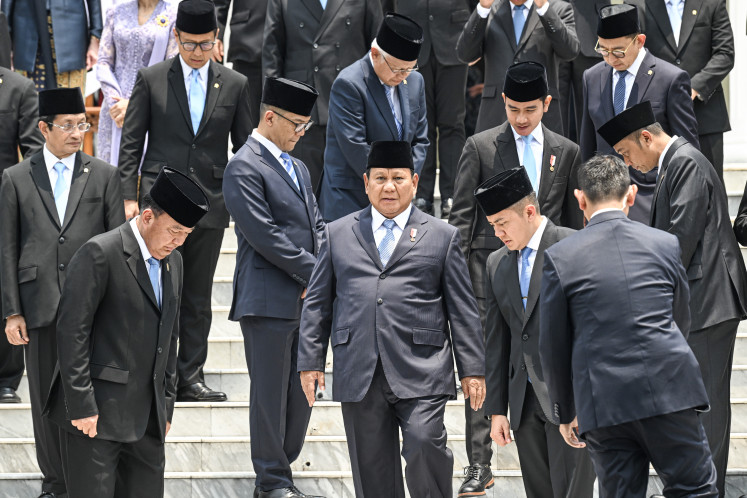Popular Reads
Top Results
Can't find what you're looking for?
View all search resultsPopular Reads
Top Results
Can't find what you're looking for?
View all search resultsShielding online shoppers
The fear of becoming a victim of Internet fraud remains ever present when purchasing goods online, despite the layers of protection that have been applied by Internet providers
Change text size
Gift Premium Articles
to Anyone
T
he fear of becoming a victim of Internet fraud remains ever present when purchasing goods online, despite the layers of protection that have been applied by Internet providers.
Indonesian Internet registration officials, however, say that Internet users in Indonesia don’t have to worry about websites that use the address.id, which in technical parlance is referred to as “country code top-level domains” (ccTLDs).
“Every website that uses the top level-domain name of .id should defer to the laws and regulations of this country,” said Sigit Widodo, the vice president of Indonesia Internet Domain Registry (PANDI).
He said that law enforcement actions against fraud were possible in the country because registrants must submit documents in applications for eight kinds of second-level Indonesian domain names: .co.id, .net.id, .web.id, .ac.id, .sch.id, .or.id, .biz.id and .my.id.
He added that registrants must scan and send evidence of personal identification when applying for every kind of domain name, but that not all of them required documents to attain legality, such as .my.id for personal use and .biz.id for small businesses.
Sigit said that there were 30,000 new registrations out of the current 93,000 domain names during January to October this year. He said that the sudden increase was because of internal improvements in the administrator.
He said that PANDI planned to raise the number of country code domains to at least 250,000 by the end of next year through 12 newly appointed registrars.
A presidential regulation related to the management of electronic systems and transactions was signed in October this year. The regulation became supplementary to the 2008 Information and Electronic Transactions Law.
Andi Budimansyah, the chairman of PANDI, said that the country code registry could suspend and even delete the addresses of those websites that violated the regulation.
Andi said there were three websites that had been reported this year: ceriwis.co.id was reported in the middle of the year due to hosting a pornographic directory. He said the other two websites were reported recently because they were selling unregistered drugs.
The first report made against ceriwis.co.id came from a user on Facebook’s ICT Watch fan page. Meanwhile, the latter two reports came from the National Drug and Food Monitoring Agency (BPOM).
The officials said that they couldn’t discuss the websites’ addresses because both of them were still undergoing the verification process.
“Our position is to be secure and use trusted identifiers. If there’s fraud in a website that uses the suffixes of .id, the victim could report it to PANDI or to the police. We can help to facilitate that,” Andi said.
He said that the regulation only protected e-commerce that took place within the archipelago.
“We call on Internet users to start shopping without fear on websites that use the domain name of .id. We also call on business people to start using .id to perform good e-commerce and become more reliable,” Andi said.
Frenavit Putra, a community developer from ICT Watch, said that registrants didn’t need to submit domain names to PANDI anymore. He said that it had become easier and faster to register domains because they were being handled by the 12 registrars.
“Before the regulation was signed, there was a monopoly on controlling the country code — registrants had to register directly to PANDI,” he said.
Frenavit said all websites that used country-code domains were trustworthy because the process was different to dot-com registration, which could be easily registered by inputting a random name and an active email.










